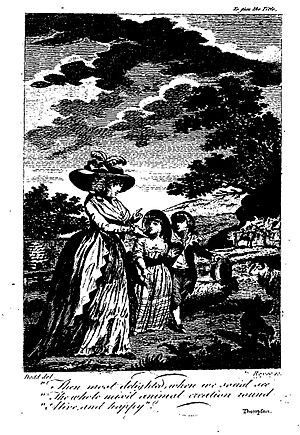Ellenor Fenn facts for kids
Quick facts for kids
Ellenor Fenn
|
|
|---|---|

From Fenn's The Rational Dame
|
|
| Born | Ellenor Frere 12 March 1743 Westhorpe, Suffolk, England |
| Died | 1 November 1813 (aged 70) Dereham, England |
| Resting place | St Bartholomew's church, Finningham |
| Pen name | Mrs. Teachwell; Mrs. Lovechild |
| Occupation | Writer |
| Nationality | British |
| Period | 1780-1805? |
| Spouse |
John Fenn
(m. 1766) |
Ellenor Fenn (born Frere; 1743–1813) was a very active British writer who wrote many books for children in the 1700s. She often used pen names like Mrs. Teachwell and Mrs. Lovechild.
Contents
Early Life and Family
Ellenor Frere was born on March 12, 1743, in Westhorpe, Suffolk, England. Her parents were Sheppard and Susanna Frere. She had an older brother named John Frere. In 1766, she married John Fenn, who was a collector and expert on old things. They moved to Hill House in Dereham, Norfolk. Ellenor and John did not have their own children, but they adopted and raised an orphaned girl named Miss Andrews.
Writing for Children
Ellenor Fenn started writing books for her nephews and nieces. She was inspired by another famous children's writer, Anna Laetitia Barbauld, who wrote Lessons for Children. In 1782, Ellenor contacted John Marshall, a publisher of children's books, to see if he would print her stories.
Between 1782 and 1812, Marshall published many of Fenn's books. She often published them without her real name, using her pen names Mrs. Teachwell or Mrs. Lovechild.
Popular Books and Teaching Ideas
One of her most famous books was Cobwebs to Catch Flies (1783), which helped children learn to read. It was so popular that it was printed many times in both Britain and America until the 1870s. Her book Child's Grammar also had over sixty editions by the 1860s.
Ellenor Fenn also created special toys and games. These games encouraged mothers to teach their children at home. A historian named Andrea Immel, who studies childhood in the 1700s, says that Fenn's games show she was one of the first people to support "child-centered" teaching. This means focusing on what the child is interested in. Her games encouraged talking and learning from the child's own world. They also encouraged mothers to answer their children's questions and teach them when they were curious.
In 1795, Ellenor Fenn stopped working with John Marshall and started publishing her books with Elizabeth Newbery's company and other publishers in Norwich. Even though her books were very popular, Fenn never received money for her work. She only received free copies of her books.
Life in Dereham and Helping Others
When Ellenor's husband was made a knight in 1787, she became known as Lady Fenn. Her husband passed away in 1794, and Ellenor was left with enough money to live comfortably. This allowed her to spend more time helping others.
Ellenor Fenn started a Sunday School in Dereham in 1785. By 1788, more than 100 students were attending! She also opened a needlework school and helped poor women earn money by restarting the trade of spinning flax into thread.
Ellenor Fenn died in Dereham on November 1, 1813, when she was 69 years old. She was buried at St Bartholomew's church in Finningham, Suffolk.
Two hundred years after her death, on November 29, 2013, Ellenor Fenn was honored in Dereham. A special 'Blue Plaque' was placed outside Hill House, the home where she lived for almost fifty years. A new plaque for her husband was also put up next to it.
Selected Works
Here are some of the books and games Ellenor Fenn created:
- Set of Toys (around 1780) - a game
- School Occurrences (1782-3)
- Juvenile Correspondence (1783)
- Cobwebs to Catch Flies (1783)
- Fables, by Mrs. Teachwell (1783)
- Fables in Monosyllables by Mrs. Teachwell (1783)
- Rational Sports (1783)
- School Dialogues for Boys (1783-4)
- Female Guardian (1784)
- Art of Teaching in Sport (1785)
- The Rational Dame (1786)
- A Spelling Book (1787)
- Fairy Spectator (1789)
- Juvenile Tatler (1789)
- The Village Matron (1795)
- The Short History of Insects (1796)
- The Infant's Friend (1797)
- The Mother's Grammar (1798)
- The Child's Grammar (1798)
- Parsing Lessons for Elder Pupils (1798)
- Parsing Lessons for Young Children (1798)
- The Friend to Mothers (1799)
- Family Miscellany (1805)
- The Teacher's Assistant (1809)
See also
 In Spanish: Ellenor Fenn para niños
In Spanish: Ellenor Fenn para niños
 | Bayard Rustin |
 | Jeannette Carter |
 | Jeremiah A. Brown |

